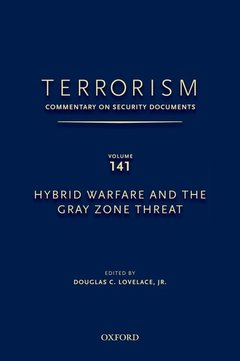Description
TERRORISM: COMMENTARY ON SECURITY DOCUMENTS VOLUME 141
Hybrid Warfare and the Gray Zone Threat
Terrorism:Commentary on Security Documen Series
Author: Lovelace Douglas
Language: English
Subject for TERRORISM: COMMENTARY ON SECURITY DOCUMENTS VOLUME 141:
Publication date: 07-2016
392 p. · 25.7x17.8 cm · Hardback
392 p. · 25.7x17.8 cm · Hardback
Description
/li>Biography
/li>
Terrorism: Commentary on Security Documents is a series that provides primary source documents and expert commentary on various topics relating to the worldwide effort to combat terrorism, as well as efforts by the United States and other nations to protect their national security interests. Volume 141, Hybrid Warfare and the Gray Zone Threat, considers the mutation of the international security environment brought on by decades of unrivaled U.S. conventional military power. The term "hybrid warfare" encompasses conventional warfare, irregular warfare, cyberwarfare, insurgency, criminality, economic blackmail, ethnic warfare, "lawfare", and the application of low-cost but effective technologies to thwart high-cost technologically advanced forces. This volume is divided into five sections covering different aspects of this topic, each of which is introduced by expert commentary written by series editor Douglas C. Lovelace, Jr. This volume contains thirteen useful documents exploring various facets of the shifting international security environment, including a detailed report on hybrid warfare issued by the Joint Special Operations University and a White Paper on special operations forces support to political warfare prepared by the U.S. Army Special Operations Command, as well as a GAO report and a CRS report covering similar topics. Specific coverage is also given to topics such as cybersecurity and cyberwarfare, the efficacy of sanctions in avoiding and deterring hybrid warfare threats, and the intersection of the military and domestic U.S. law enforcement.
Douglas C. Lovelace, Jr., is the Director of the Strategic Studies Institute at the U.S. Army War College. Earlier in his military career, he worked on national security directives. He holds an MBA degree from Embry-Riddle Aeronautical University and a J.D. from Widener School of Law.
© 2024 LAVOISIER S.A.S.




